This is a 7 part thread on the Bitcoin narrative originally posted Summer 2014
Part 1 - Reputations
@r_c pointed me towards this piece in Technology Review exploring how Big Data, Decision Support, Behavioural Mapping and Targeting and Predictive Analytic has been the basis of FICO's credit reporting business for almost 60 years
And it left me wondering just how efficient these vendors of reputations are in this disruptive new world of the networked economy? For example: How do these vendors of the credit report stack up against the vendors of the social influence report?
So I mapped the data and discovered, as expected, these business models don't scale. There is no network effect in play here. This is old school. Revenues are a function of people. To grow the business you need to hire more smart employees. Data Scientists. Brain Surgeons. Growth becomes a function of supply and demand. As the competition for data scientists increases margins will be squeezed and/or prices will go up.
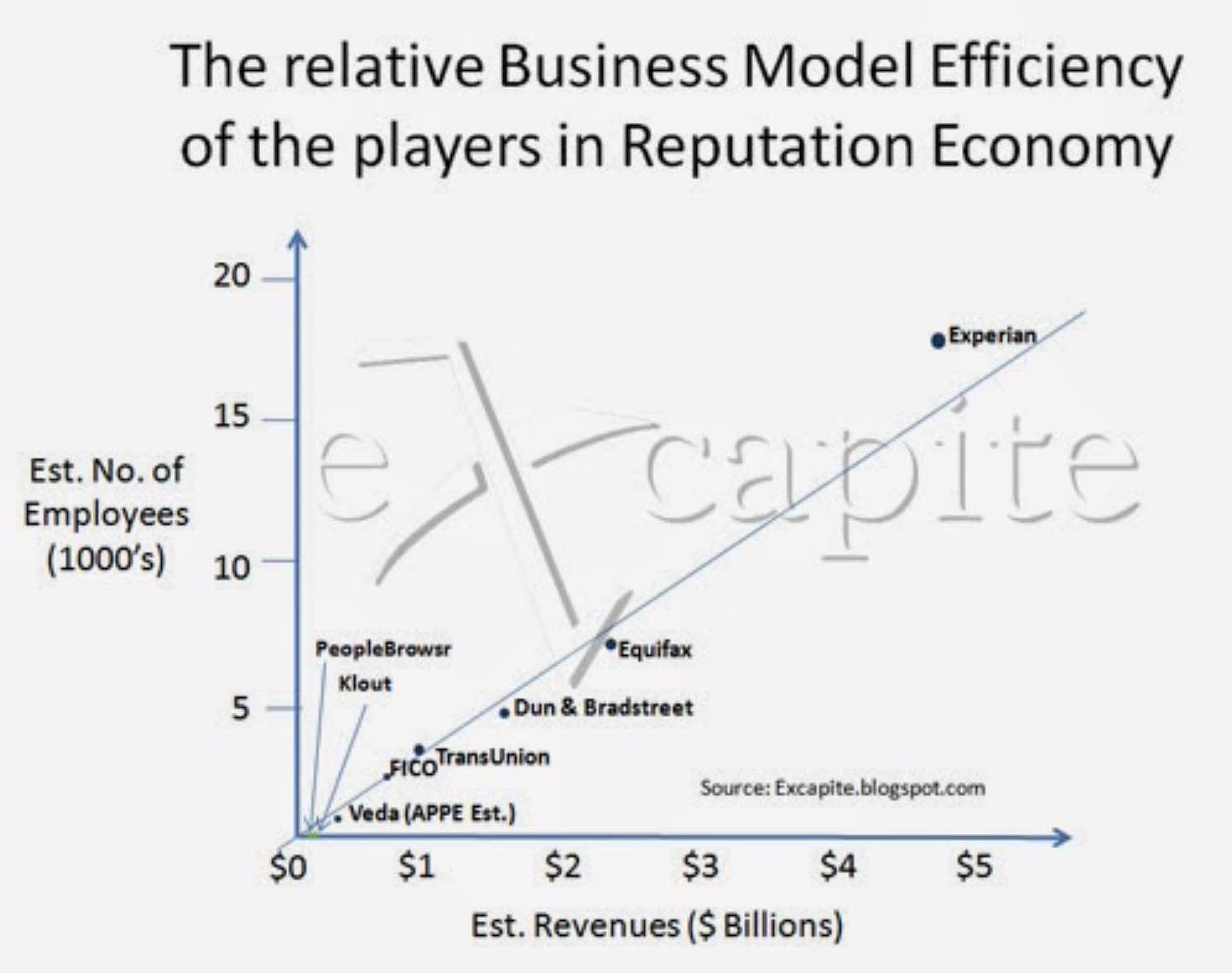
And this is reflected in their market cap. More market share. More revenues. Higher market cap.
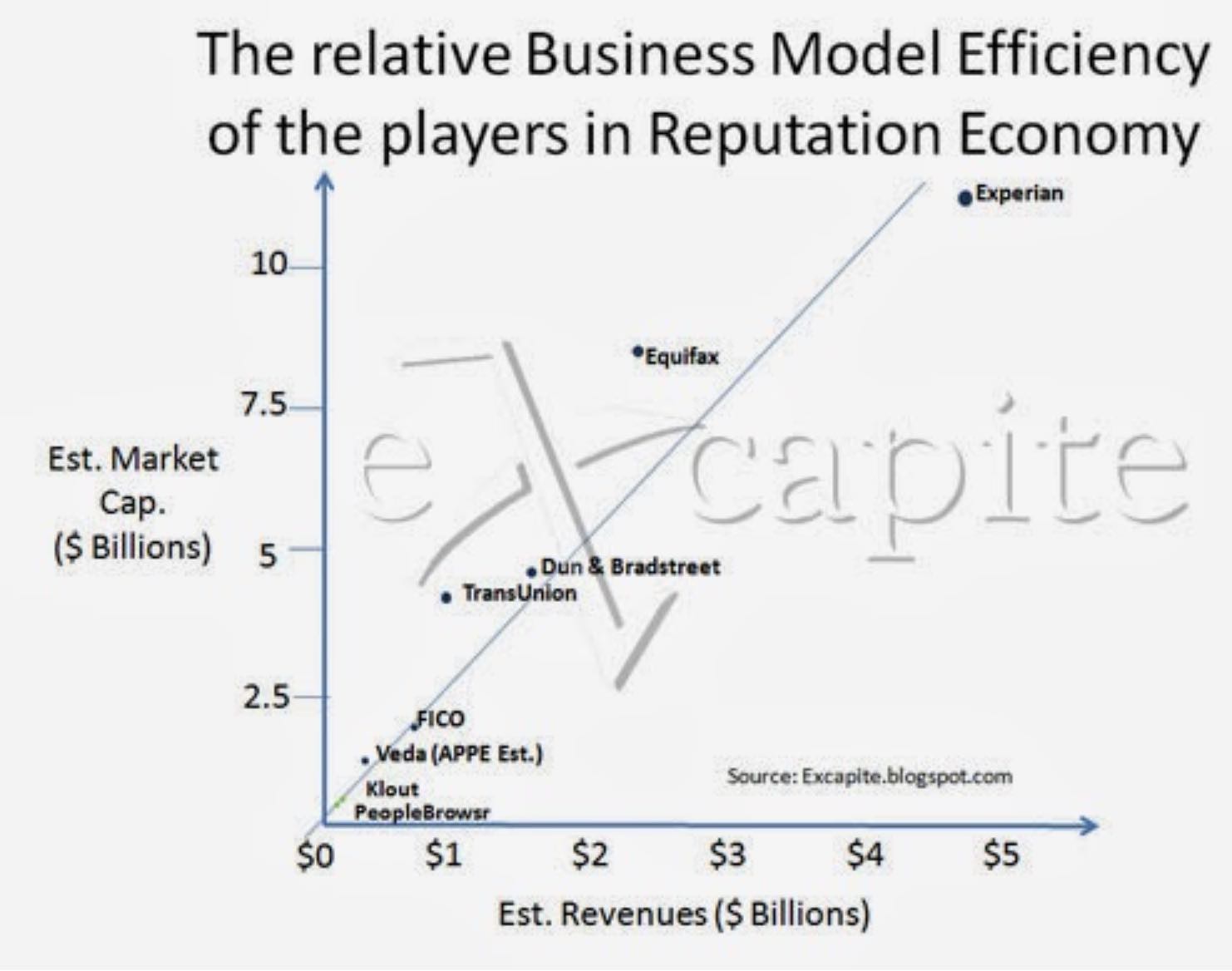
It is an old way of doing business. The question is: Can it be disrupted. Disintermediated? Prosumed?
Can the customers be encouraged to let their fingers do the working?
So I added a few different times of Rocket Scientists into the mix. Other vendors of reputations. Ad Agencies. PR companies. Media monitors. Plus the emerging players in this space. The Googles and the Facebooks. The keepers of the interest graph and the social graph.
And here's what it looks like.
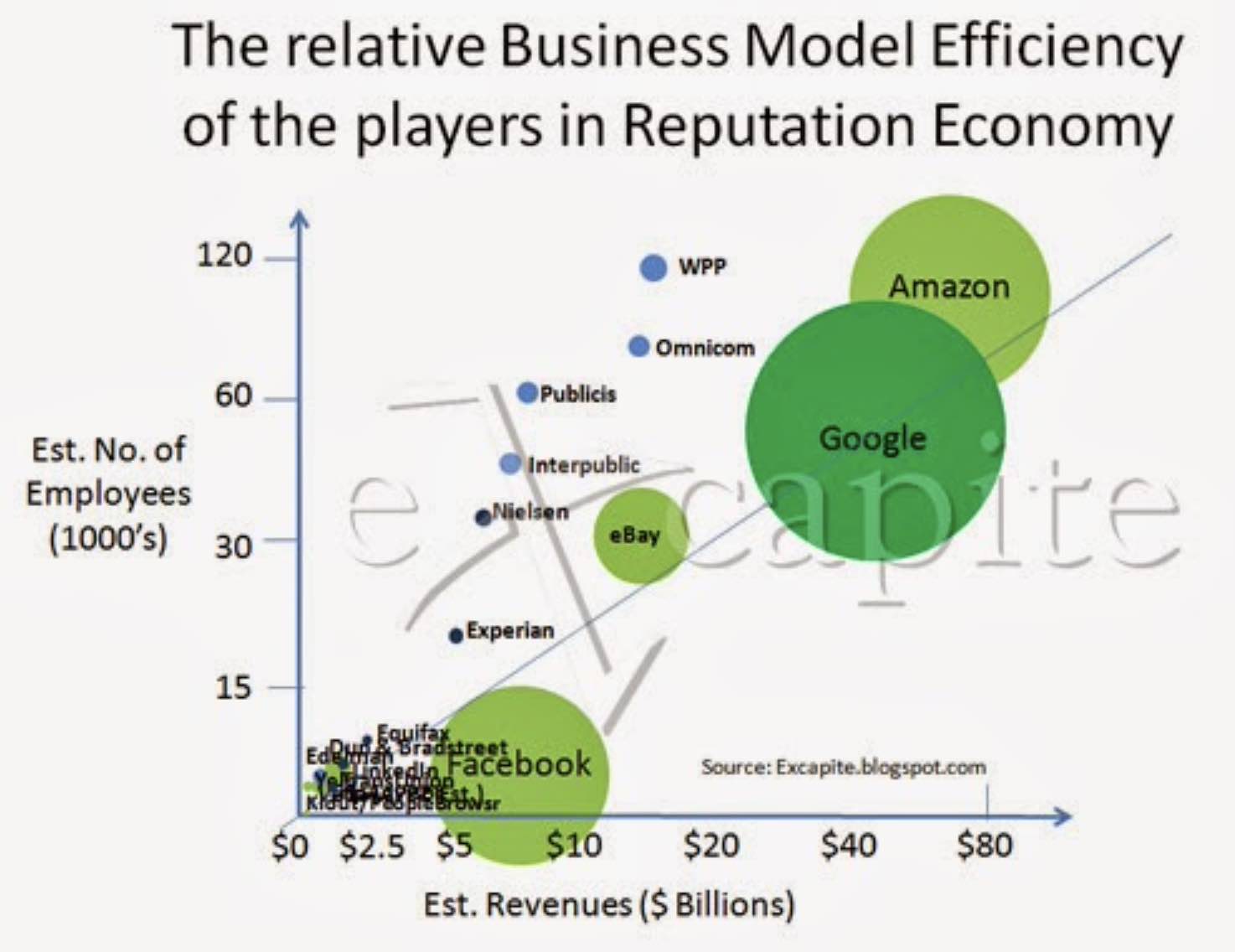
Suddenly the credit report specialists look obsolete. As do the emerging
social influence report specialists. Not just compared to the market cap of the Googles, Facebooks, eBays and Amazons of the new order. But also compared to the global Advertising conglomerates. Seemingly there is more money to be made in manufacturing reputations than monitoring them.
And then I took it one step further. Measuring the employee efficiency.
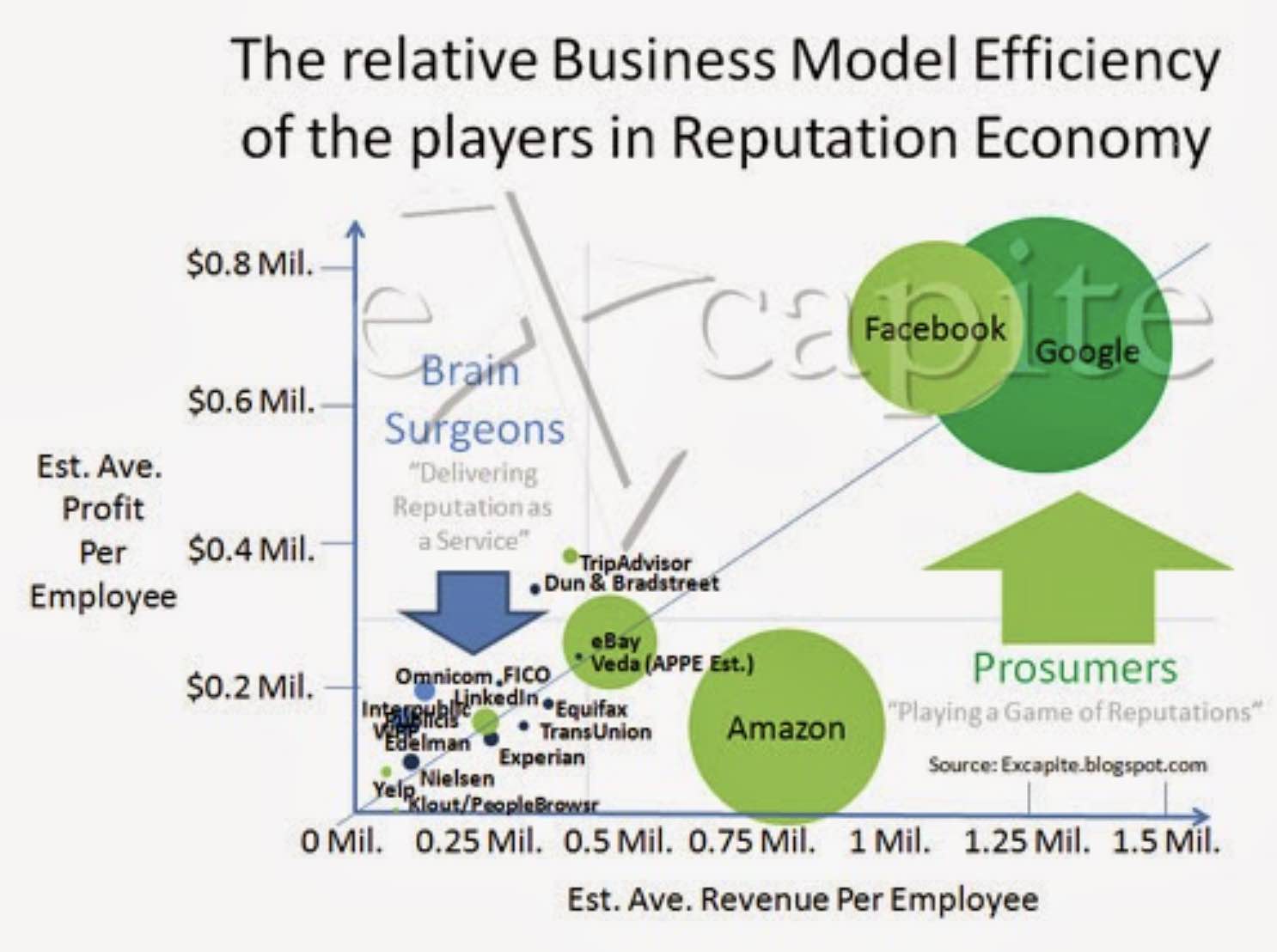
And, not surprisingly the vendors of the "Game of Reputations" easily beat the vendors of "Reputation as a Service". Simply because, contrary to popular belief, the future of knowledge at work isn't rocket science, it is all about designing and marketing the engines of prosumption. Enticing the customer to do the work for FREE. Preferably while paying for the privilege.
Part 2 - Disruptions
If you took the time to read Marc Andreessen's case for BitCoin in the New York Times the other day you would have discovered that BitCoin is simultaneously a digital ledger/bear instrument/currency/payment system. You can also add the words exchange and perhaps even developer platform into the mix.
Confused? Thought so. So I mapped the logic into a map to make it easier to understand (maybe)
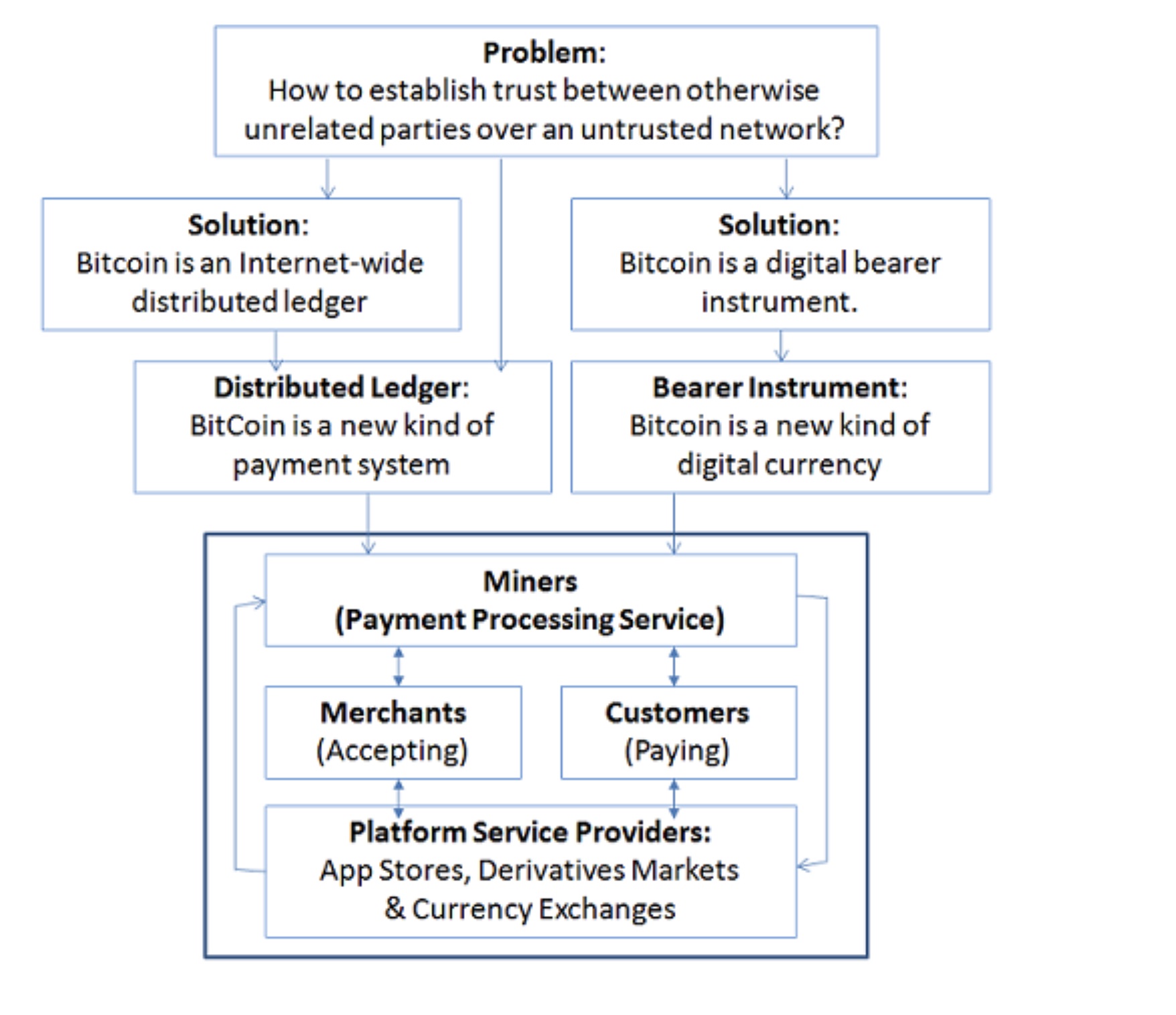
So, after we have deconstructed the essay, we've discovered, it's a new kind of payments processing platform that utilises a digital ledger to transfer a new kind of digital currency across the Internet so merchants can do business with customers they don't even (want to?) know.
Good. That's settled. A definition we all agree on. A single version of the truth. All we need now is a Bitionary to keep it safe and easy to remember.
Moving on.
Key words. It's a new payments processing platform.
Problem. History suggests new entrants into the payments processing business struggle to disrupt the incumbents.
Mobile has been the next gen payments platform for at least a decade. A couple of years back we mapped the explosion in investment in mobile payments
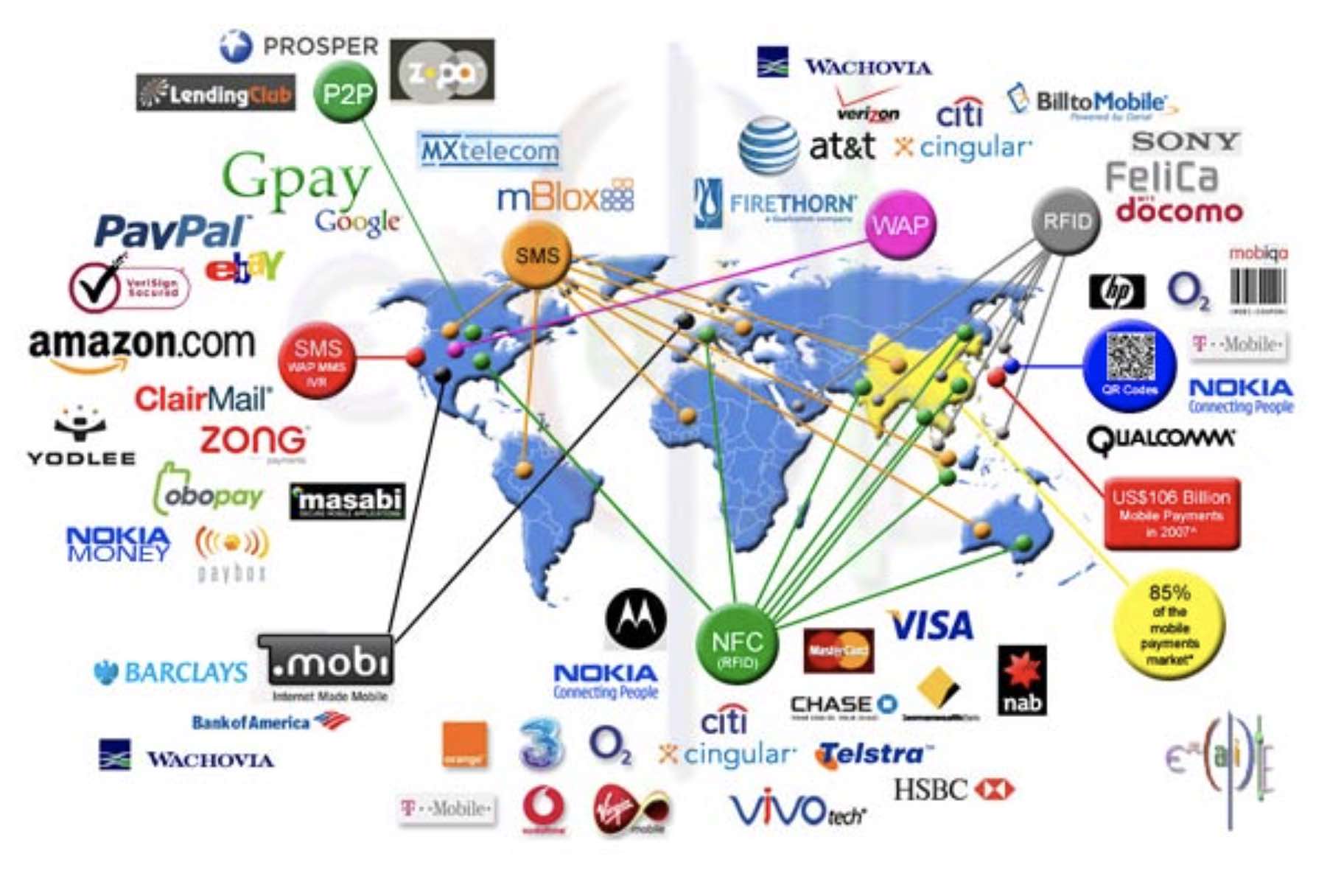
But we have yet to see much progress there. For example Square: Total Payments Volume in 2012? US$10 billion.
Prior to mobile. Think web.
What ever happened to the recent spate of disruptive web 2.0 currencies e.g. Facebook Credits or Google Wallet? Then there's PayPal. The internet payments flagship. Total Payments Volume in 2012? US$145 billion.
In comparison the Credit Card industry did in excess of US$15 Trillion in Credit/Debit Transactions.
Plastic reins supreme.
The question is why?
The reason being of course, when it comes to disrupting paper with digital, the Financial Services sector achieved that objective decades ago.
The next question being of course... can BitCoin, or any other type of digital currency, now disrupt the ubiquitous "Plastic Fantastic"?
The answer being of course:
Never mind the currency. What's the game?
The game being of course one of reputations. The currency in play? Credits of course. The winner? The one who extends the most credit. The losers? The one holding the most debt.
At least when all the chips are counted.
The Plastic Fantastic won the merchant payments war because it provided both Merchant and Customer with a line of credit. Want it? Want it now? Then don't wait. Don't worry about having the money. Use your card. One magic swipe of plastic and it's yours. To keep. Take home. Treasure. That's the magic of plastic.
Now take another look at BitCoin. Where's the magic? You put something here. Yes here inside this virtual box. Tell somebody it's there. Send them the key and they can collect it. Wow. Fantastic. Now that changes everything.
Really?
The ubiquitous "Plastic Fantastic" disrupted by a virtual bank deposit box?
Wow. I was expecting something a little more sexy. You know. An audacious wink and my Google Glass takes care of business while I turn my fleeting attention to other things. Time's money after all. And who has time for trading digital keys when there is shopping to be done?
But here's the problem. We are talking back office. The engine room. The technology that takes care of business. Not the technology generating the business. In this context "Digital is better" is a siren call to the inner geek. Not the inner consumer. People just want to get on with business. Get on with their lives. Keep it simple. If plastic or cash still works for you then it works for me.
So do you see the challenge? What's missing is the killer habit. The killer experience. The conditioned response that will render the old "plastic fantastic" passée. Obsolete. Retro as the LP record or VHS. The question is: What is it?
That, as they say, is the $15 Trillion question. Or, should that be the $15 Trillion line of credit?
Disrupt the supply of content and you disrupt media. Disrupt the supply of credit and you disrupt payments.
It's not rocket science. Just good business.
If you are in any doubt. Just take the time to find out what the GFC was all about.
Disruptive credit.
Part 3 - Responses
Think of this not only as the counterpoint to that post on SnapChat, Instagram, Pinterest, Angry Birds and the myth of the Viral App but also as a bridge in this series on Never mind the currency. What's the game.
You will recall in that SnapChat, Instagram, Pinterest, Angry Birds and the myth of the Viral App post there was a significant outlier to the proposition that press coverage manufactured viral growth.
The outlier was of course Twitter.
Now the interesting thing with Twitter is the myth tells us it popped at SXSW in March 2007. And indeed The New York Times and the mainstream press extensively covered Twitter after the SXSW moment. However it didn't really pop for another 2 years. Arguably the explosive growth didn't really begin to happen until the press amped up the volume following the Series C funds injection. - SnapChat, Instagram, Pinterest, Angry Birds and the myth of the Viral App
Here is the graph that illustrates this.
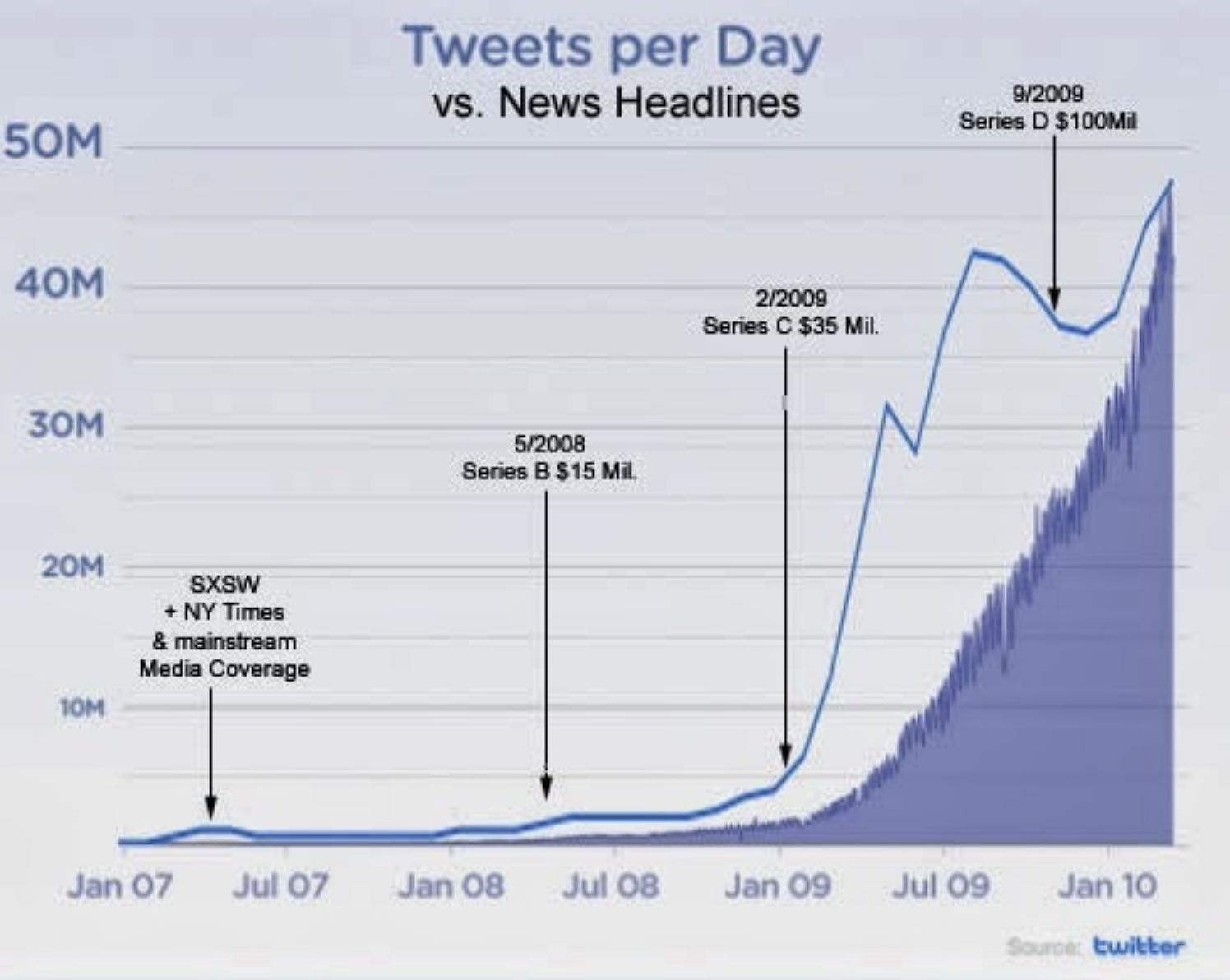
Now let me show you the same graph with new pivot dates.
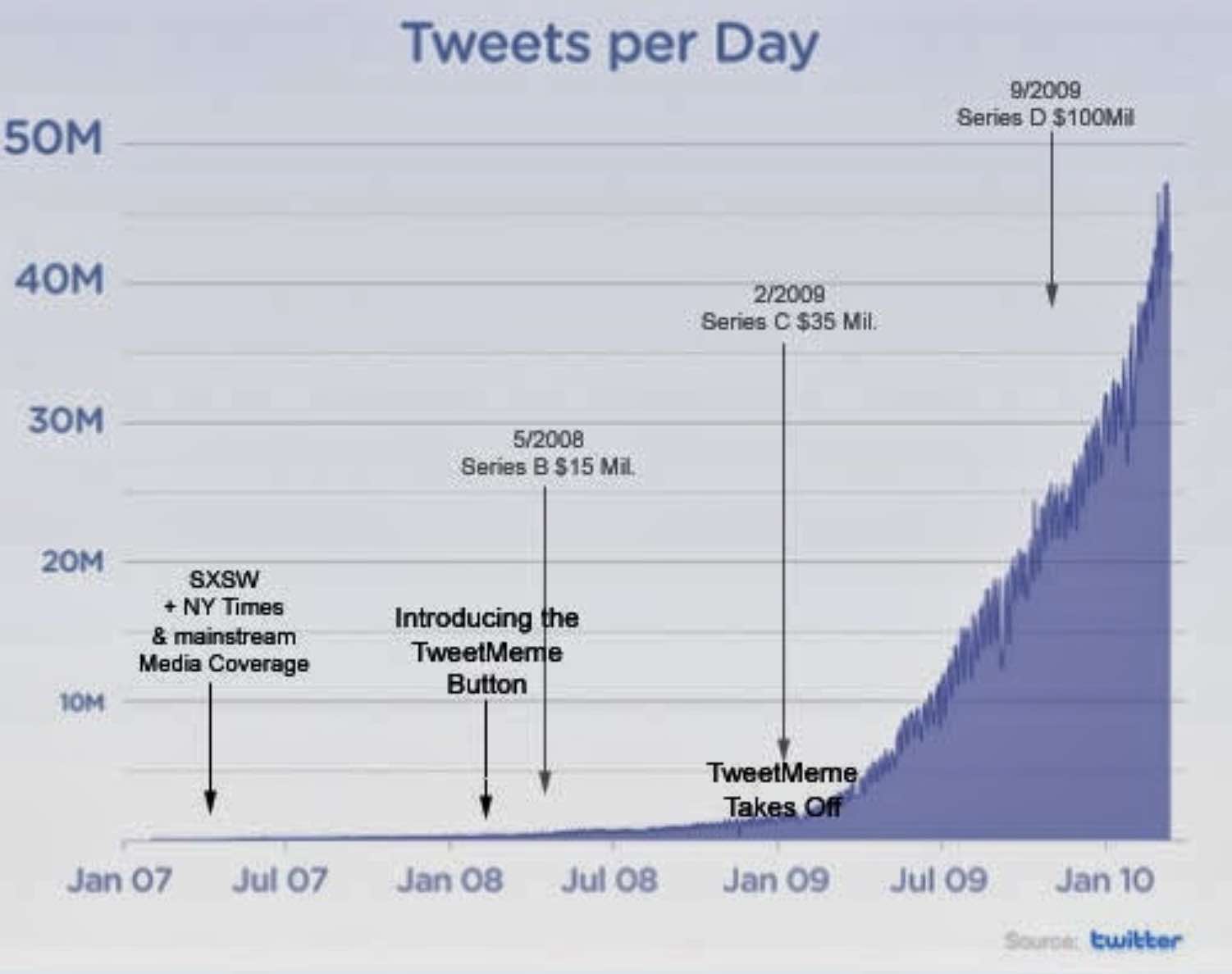
The pivot dates reference the introduction of the TweetMeme widget for bloggers and news sites. The original ReTweet Button. It was the third party strategy that turned Twitter into a game of ReTweets. The pivot when the RT became a form of currency. It was so successful Twitter created their own Tweet button in August 2010. Six months after Facebook had introduced the same game with the LIKE button.
Was TweetMeme an original idea? No. Digg had launched their widget a couple of years earlier.
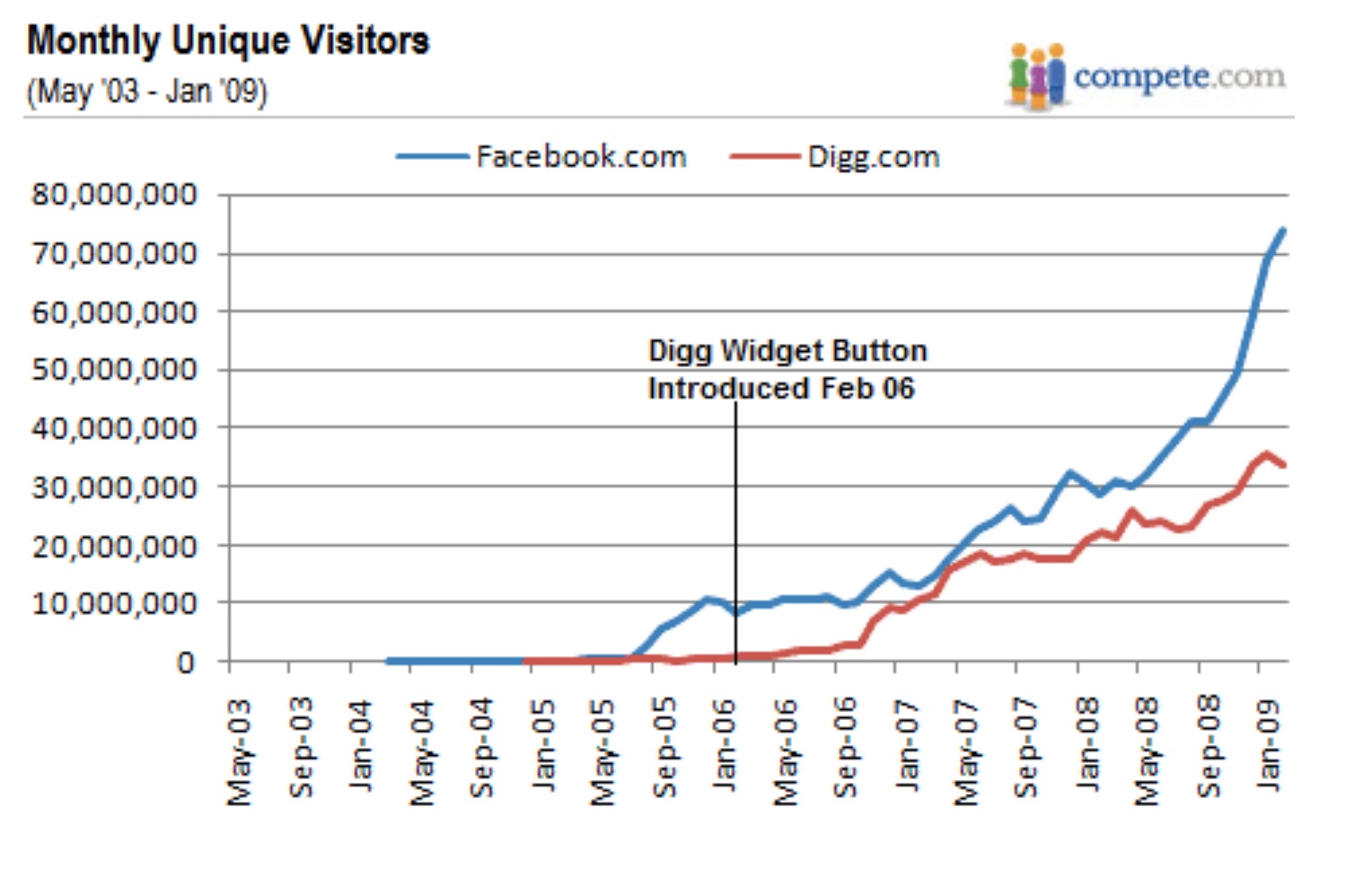
It had the same effect on viral growth.
The point being viral growth is a function of the game. The conditioned response. The feedback loop.
A button that is front of mind on every page you visit prompting the conditioned response. Encouraging you to share your experience with others. It is something the madmen of yesteryear could only dream of.
And all because, as I demonstrated a few years back, across the network behaviour has become the new messaging.
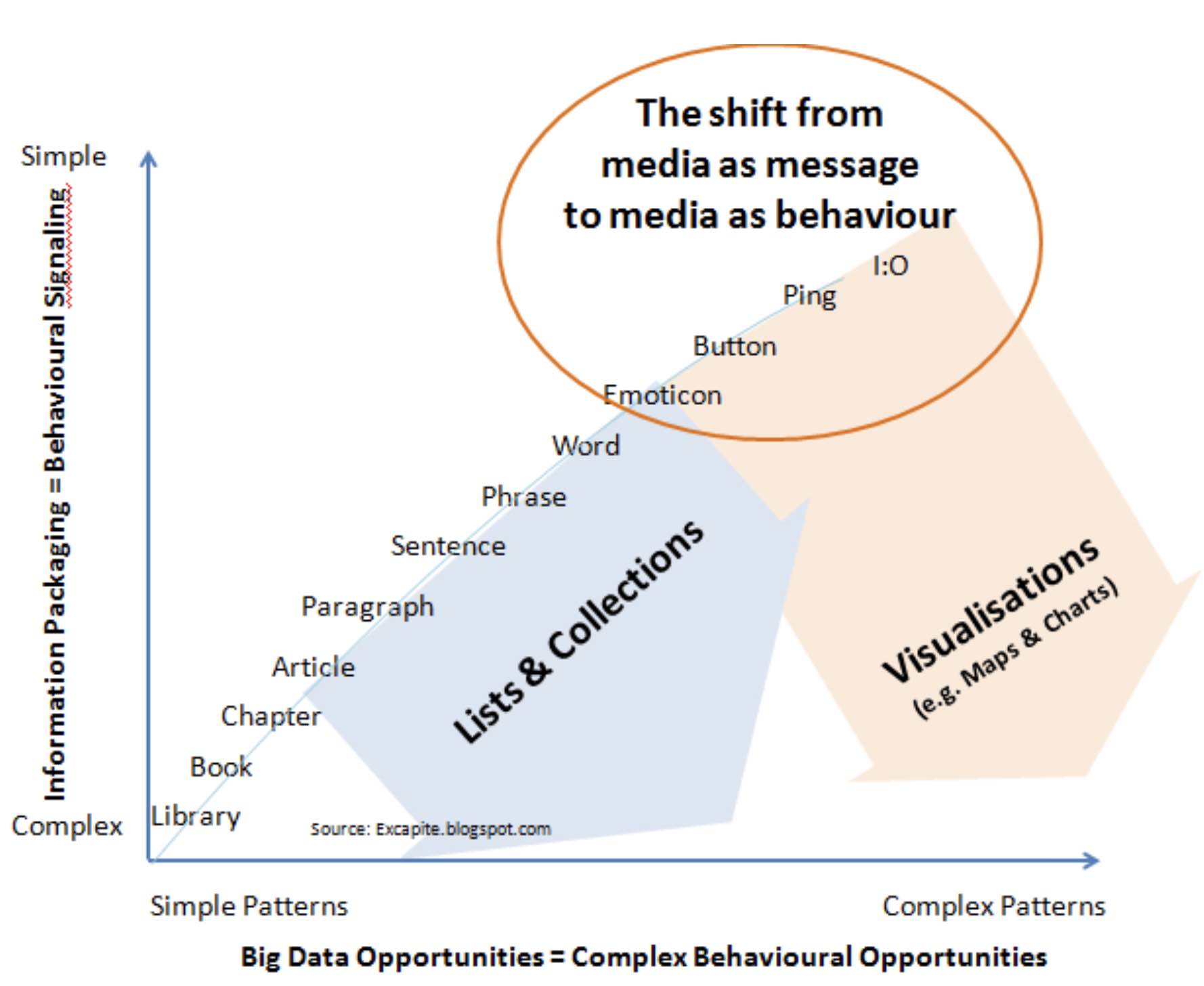
Today the *LIKE* button has become ubiquitous. The reason being of course, of all the advertising techniques that have been tried over the years (think Display Ads), the *LIKE* button is the only thing that works as a universal call to action across the network.
It permits what I have described before as digital Pheromoning: The conscious or subconscious activity of marking out territory on the network with Pheromones.
The networked had been gamed and the crowd loved playing it. A reputation for discovery being the *shared* currency.
The audience had became Digital Pheromone Junkies. And a new type of brand advertising had been forged in the sphere of public influence.
Finally social influence could be monitored and measured. And a new kind of business model emerged. The social score keeper. The tracker of our networked pheroamings.
What does all this have to do with the adoption of BitCoin as a payments platform?
Part 4 - Rewards
Kontra tweeted earlier... Electronic voting.
BitCoin.
Avalanche of posts yet to be written.
You could express this in others ways. Think... Rights (Digital or otherwise).
BitCoin.
Avalanche of posts yet to be written.
Truth is, what we are seeing, reads more like... BitCoin.
Unlimited Opportunity.
Avalanche of posts already written.
Scrape away the ornamentation and you'll discover at the heart of the narrative... BitCoin.Ledger
Avalanche of posts already written.
Or, if you a feeling reductionist... BitCoin.List.
Avalanche of posts already written.
Which inevitably translates into... BitCoin.Database.
Avalanche of posts already written.
You see, in the end, BitCoin is a new kind of list engine. A database for... what ever you want that database to be... but for now let's just say "a database for... special things". Important things. Meaningful things.
A list with meaning now memeing.
But what of the game? How do you turn yet another list into a yet another game everyone will want to play?
The same way you turn all the other lists into a game. You sing a familiar siren song. Something along the lines of "Money for nothing and your lists for free".
For here is the dualism that is BitCoin. There is the ledger and then there is the land grab. The speculation. The growth story. The bubble. The euphoria. The gamble. The lottery.
You could say it's Facebook, Linkedin or Twitter all over again. The story of how you market a list engine. A database for... a new breed of winners.
Of course what you won't see is... Bitcoin.
Fractal Narrative.
Avalanche of posts now being written.
Simply because playing the game of "money for nothing and your lists for free" is far more exciting and, in some cases, far more rewarding than deconstructing the rules of the game being played and the social conditioning that attracts and bind us to the game.
BitCoin the ledger establishes trust between otherwise unrelated parties over an untrusted network like the Internet. BitCoin the speculative investment is a measure of the trust we place in the list. In this it is no different to Google or Facebook. Their market capitalisation is a measure of our collective trust in their respective lists. Their list is their competitive edge.
And understand this is a game of lists played out on yet another list. The stock market. Be it NYSE or the NASDAQ.
The game at hand is one of playing the ledger. The trick is to game it to one's personal advantage. But well within the rules of course.
Capitalism is, after all, ultimately a game of power and exclusion on the list. Who is in? Who is out? Who is top? Who is being disruptive? Who is being disrupted? Who is forgotten? Hardly... the list has no memory.
Disrupt the list and you disrupt the market.
Disrupt the list too much and you disrupt capitalism.
Turn the list into a fractal narrative, a real time flow, and you not only disrupt capitalism you disrupt the future. e.g. CDS's become GFC's.
The reason being capitalism starts and finishes with the ledger. The list of equity, liabilities and assets, credits and debts. She sum of endeavours: past, present and proposed. Without the list to stimulate interest in the market there is no investment and without new investment there are no new jobs. No new products. No new services. No new factories. No new shops. No new markets. No new logos. No new customers. No new anything.
So without interest there is no, how should we put it?, INTEREST.
And so do you see now the stakes in play? BitCoin isn't just another payments system. BitCoin isn't just a new type of ledger. A new type of list. Another database for...
BitCoin, taken to its logical conclusion, is a new form of capitalism.
Capitalism 2.0. An entirely new type of capitalism. Well beyond the limitations of paper and plastic.
The perfect ledger. The perfect list. The perfect database. Capitalism Perfected. Some would say optimised. For unlimited growth, naturally.
This then is something special. Very special. Think Money, but with the added benefits of the network effect.
Think money. Re-imagined as an emergent complex adaptive system.
Think money. + the murmuration of starlings.
And, if you think about it, but not for too long, isn't that a game anyone, with a lust for life and hungry for a dollar, would be wanting to buy into?
To get hooked on?
To play 24/7? For the rest of their lives?
Because this, as we have seen so many times before, changes everything...
Part 5 - Revelations
So this then is the Bitcoin story. A game of chance created by clever heads. Played by investors in long tails.
Flip a coin. A BitCoin. And what do you know. Every one's a winner!
In the absence of a line of credit to fuel growth you create a market for unlimited growth. All by the flip of a coin... :-)
Simple really.
But to make it work. To make it stick. To make it go viral. To package it up so the network will embrace it. You need a good story. A compelling story. A story that excites. A story that turns heads and pockets. A story of good and evil. Of good guys and bad guys. Of fair maidens and dragons. Of battles to be fought and won. And, of course, fortunes to be made. In a not so far away land. A magical land. Awash with unheard of treasures. Look at the horizon and you can almost touch it. Just reach out and the future is yours...
And so we come to the inevitable question. The chicken or the egg? PR or organic growth? What has fuelled the Bitcoin rush?
Well, let's see. Let's map news coverage against the growth in the Bitcoin market capitalisation.
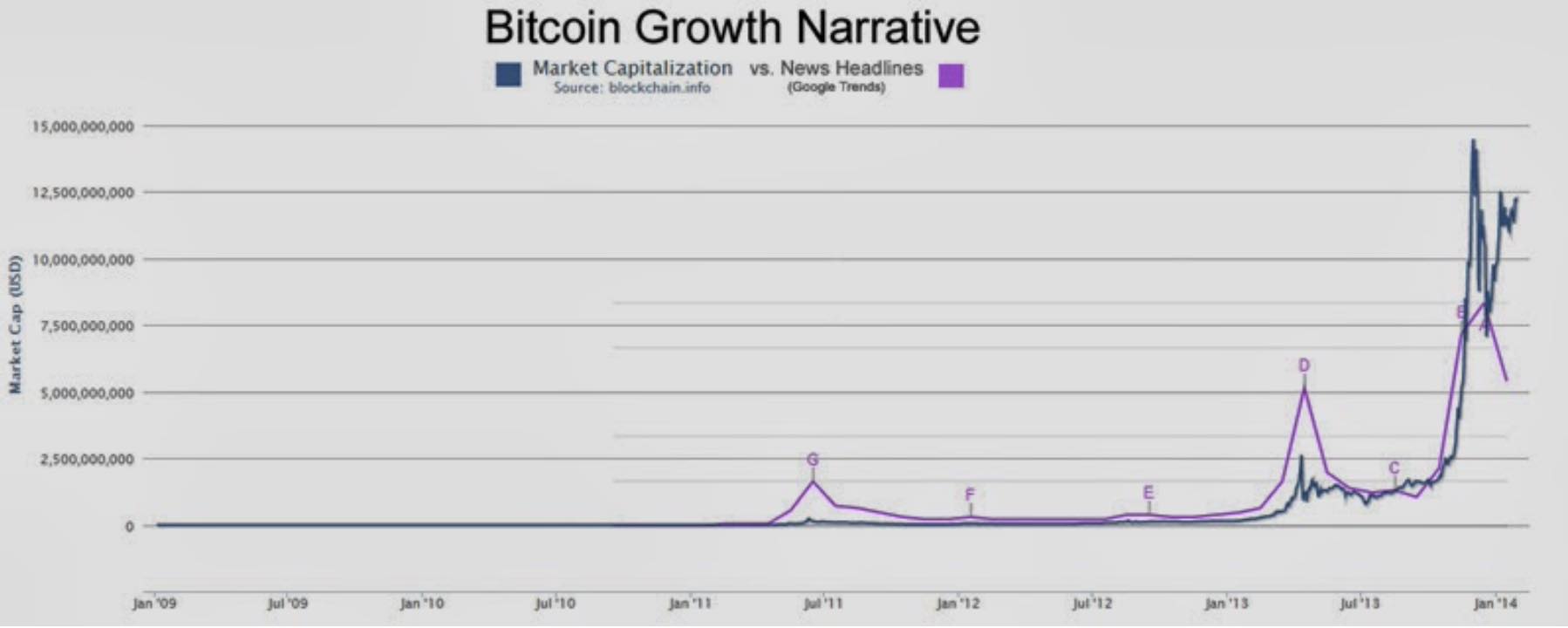
Now, give all we know about viral apps, the efficiency of a network of conversation and the latent power of traditional media to influence the crowd, are we surprised to discover the Bitcoin price maps to the increase press coverage?
Honestly? No.
But that's what makes it all the more entertaining. You can watch the passing parade in much the same way one watches a game of chess or a game of football or, dare I say?, a gladiatorial contest. You can see the moves before they happen. You can anticipate the pivots. The moments. The tactics. The strategies. The performance. The colour and movement of the spectacle as it unfolds.
The crowd roars. The cheerleaders dance. And the players do battle. And the coaching staff scream in support. Run, Run, Run harder. Faster. Press. Pivot. Stretch. Reach out. Grasp. Yes Grasp firmly. Tightly. For there are lists to be climbed. Scaled. Ascended. Topped. Mounted. And in the meanwhile there is money to be made. Backing the winners. Betting on the outcomes. For these are truly magnificent times. The spectacle unfolds. And we are all delighted. So much so that, almost inevitably, enchanted by the story that is unfolding, we ask... can we play too? And if not us why not our children? Surely they can play this game too?
The point I want to make here is the same one I have been making for a while. Viral growth is a function of network harmonics. The only question of real interest is who is conducting the orchestra. Or, should that be the choir? And what is the tune they have chosen for the hour. What have they selected this time to entice us to get up on our feet and dance.
For in the end that is the true art of the storyteller. Nay the pied piper. They weave the narratives, nay the tunes, that encourage us to engage in life.
They charm us into being... what ever it is we choose to (now) be... come.
The revelation. The joy of knowing. Wanting. Yearning. Competing.
And that's what makes it so exciting. So real. So now. So important. So front of mind. So effective in achieving the conditioned response.
The future is what we want it to be.
Part 6 - Futures
OK. How do we wrap all these threads together?
Is the lesson to be learnt "You build a Brand, not with advertising, but with publicity?".
Hardly. For anyone in the game that is old news. Old school. MarComs 101.
The old pros have long known you build the Brand in the furnace of public opinion. Advertising is a defensive strategy. It is what you use to protect your space. To restrict the competition's supply of oxygen.
This is why the whole idea of advertising on social media is something of an oxymoron. And, of course, what makes the market valuations of the social media flagships so delightfully paradoxical.
You don't inject messages into a social network to change behaviours. You inject behaviours to change the message. The conversation.
The same applies to mobile advertising. You don't inject messages into a mobile network to change behaviours. You inject behaviours to change the message. The conversation.
The medium, after all, is the message.
But we have been there. Before. Many times. Yawn.
New thoughts.
The success of the disruptive network narrative. Be it Facebook, Apple or BitCoin. Is best understood by the failure of the Global Warming lobby to affect change. Changes in behaviour. Changes in expectations. Changes in the market.
Within 20 years the disruptive network narrative created something out nothing. Within the same period the Global Warming lobby's Doomsday narrative has created nothing out something.
Why? Because it failed to spark that most basic of human needs. Hope. Hope in the future. Hope in prosperity. Hope that what I am working on is going to make difference. Not only for me but for others.
Facebook, Apple and BitCoin. And yes, even Kickstarter. These are all platform of hope. They inspire people to take risks. To face the challenge. To get involved.
Compare that to Global Warming. Global warming the platform... for the future.
Do you see now how narrative shapes behaviours? Shapes our hopes and expectations?
The future can't be saved but it can be made to be what ever we want it to be.
That is the technologist's dream. To reinvent the future. One revolution at a time.
Understand this and you will come to conclusion innovation today isn't about problem solving. It isn't even all about re-imagining a future full of hope and unlimited possibilities. It's all about creating a new game to play. A new game to explore. To master. To conquer. To ultimately win.
Google is a game. Facebook is a game. Twitter is a game. Pinterest is a game. LinkedIn is a game. The app store is a game. Smartphones are a game. BitCoin is a game. Venture capital is a game. The world's banking system is a game. The world's stock markets are a game. Fashion is a game. Media is a game. Education is a game.
The only question that really needs to be asked is when will we start playing the games that really matter?
Because, if the climate scientists are right, then you can bet all the Bitcoins you *LIKE* that Global Warming and Mass Extinction isn't a game.
Part 7 - Rules
Ok. let's wrap it up. 7 is enough. If we can't deconstruct the BitCoin narrative in 7 days there is something wrong.
Rules. Playing by the rules. Knowing the rules. So what are the rules?
We'll begin with a question. Why now? Why so much press for BitCoin now? After all it's been around 5 years. The market ran with the "Future is Social" as soon as mySpace hit the market. It grew out of the success of the Google IPO. So why now? Why 5 years on?

The answer? The quick answer? The simple answer? Take a quick look at the NVCA data.
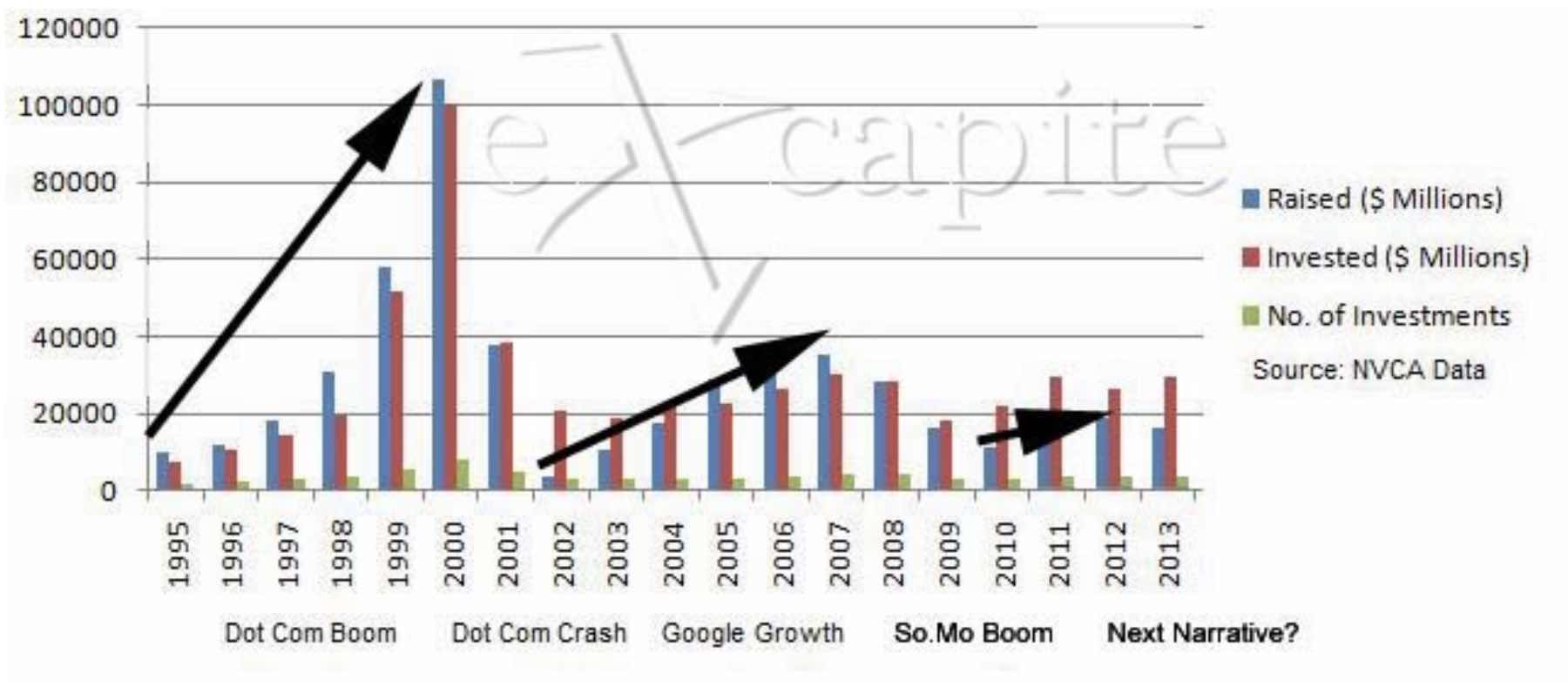
Venture capital has entered a new cycle. The social media pipeline is rapidly flowing into the market. Mobile made money for Apple, Google and Samsung. Time for a new round of investment. Time to raise the nextgen of investment funds. Thanks to Facebook social was a success story. Admittedly a dead cat bounce compared to the Dot Com Boom. But a success story all the same. Time to build on that success. Time to ride on the coat tails of the Facebook IPO. Make hay while the sun shines brightly. Time to ignite the market with new tails. Time for a new gold rush.
And apparently, judging by the press coverage and the industry commentary, BitCoin is it.
We disrupted business in the 90's. We disrupted social in the 00's. This time it's going to be money.
That simple really. Not rocket science.
The challenge for the VC industry being each iteration of the disruption story has delivered less. Less inflows and less success. So what will the fourth telling achieve?
On the upside the future of money is a big story. Bigger than the future of retail. Certainly bigger than the future of media or IT.
The question is: Is is big enough to disrupt the venture capital industry? Bring back the glory days?
I guess we'll just have to wait and see.
The rules of the game however are the same as they always were. Shout gold and make your money harvesting the rush. Sell the supplies, provide the entertainment and own the casino.
So step up an play the game. Anyone can play. The rules are very simple. All it takes is your time.
At least until next time... ;-)
BTW: If you are interested. The level of VC funding for BitCoin innovation as percentage of all funding over the past 12 months? 0.25%
Bonus: It's *LIKE* PayPal for BitCoin
The devil, as they say, is in the detail. So let's do a bit of digging to see if we can uncover a disruptor's playbook from all this Bitcoin coverage.
We'll begin with a hypothesis. A disruptor's roadmap.
It begins with a slogan. An idea that you seed into the marketplace. A differentiator. A Brand. Something that is front of mind. You build on this idea via publicity. The Brand is, after all, forged in the furnace of public opinion. You amp up the volume and turn all this publicity into a feedback loop. You go social. You get the market involved with your brand. It become a game. Amplifying the feedback. You attract investment. Big name investment. This in turn amplifies the feedback. All the time the user base grows. The network effect kick is in. You've achieved ignition.
OK. Let's map the theory against the reality.
Let's take a look at Coinbase.
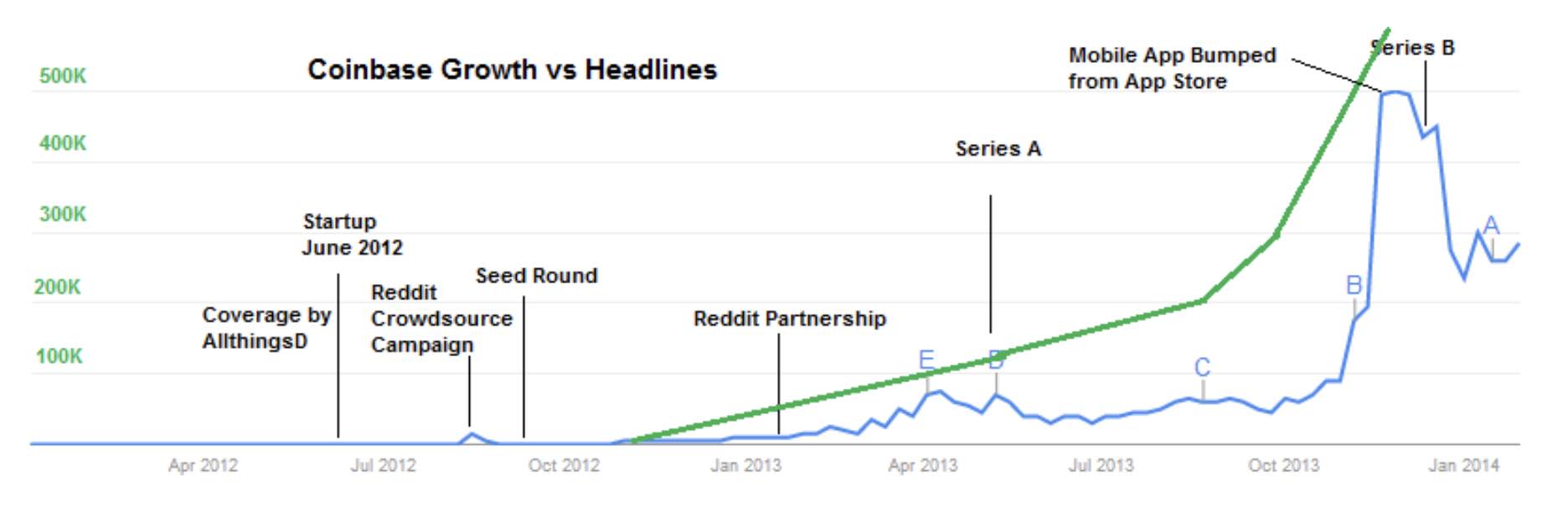
The Branding was established from day one. You'll find it in the press coverage. See AllthingsD's Betting on Bitcoin: Coinbase Wants to Be the PayPal of Internet-Only Currency. What makes Coinbase special? Different? It's *LIKE* PayPal for BitCoin.
Within 2 months we discover a Reddit thread seeking crowd sourcing funds for "Coinbase: A PayPal for BitCoin". The game begins.
Seed round follows. The connection between all these threads being of course Paul Graham and yCombinator. Less a start-up more product launch.
February 2013 sees Reddit Accepting Bitcoin for Reddit Gold Purchases and within a year we have travelled from idea to the $5 Million Series A investment round led by high profile VC Fred Wilson of Union Square Ventures.
Ignition. Feedback loop engaged. And the journey to the $25 Million Series B round, lead by Andreessen Horowitz's Chris Dixon takes just over 6 months. Game on. Let's talk BitCoin.
18 Months. That's all it took. From 0 to 600,000 users. But what's important is the game plan. It began, like any new product launch, with a clearly identifiable Brand positioning statement. It was supported from day one by a PR campaign that achieved international coverage. It hooked up with key social media web sites to amplify the PR feedback loop. It encouraged the market to do the talking. Or what we would describe today as the sharing. It became a game. A cool game of alternative payments. Edgy. Anti-establishment. It played the zeitgeist. Cashed in on the moment by facilitating the movement.
It's called marketing and communications 101. And, guess what, it's not rocket science.
But it is the art of the entrepreneur.
Part 8 - A Game of Trust
Let's begin by exploring how this new technology works.
An extract from the text explains.
Bitcoin is an Internet-wide distributed ledger... a new kind of payment system. Anyone in the world can pay anyone else in the world any amount of value of Bitcoin by simply transferring ownership of the corresponding slot in the ledger. Put value in, transfer it, the recipient gets value out, no authorization required, and in many cases, no fees. - Marc Andreessen's - Why Bitcoin Matters
Hands up if you know how banking really works? Anyone? No. No matter I've been involved in designing a few systems in my time, ForEx, Direct Entry, Cheque Clearing, Credit Cards, Debit Cards. Not that it matters because how it works isn't important. What's important is your banking experience.
Which is to say the technology stack is irrelevant to you the customer. All you want to do is walk up the ATM and get your money out, or hand over your card and buy the goods, no matter where you are anywhere in the world.
What is important to you is the knowledge that the system works. Confident I get get my money when I want it in the way I want it. I can put money in and I can get money out. If there is any doubt it is about the question can I pay my bills?
You see the customer experience isn't a question of technology. It is a question of trust.
And that's why, as I have said many times before, changing the token doesn't change the game.
The game changer comes down to a question of trust.
Which of course brings us back to the Mt Gox exchange and the wider issue of trust in the global Banking System.
For Bitcoin to be a game changer. A true distributed ledger as described above then it shouldn't matter where you exchange your "paper" money for Bitcoin you should be able to exchange your Bitcoin for "paper" money regardless of the health of the exchange where you originally inserted your money into the system.
The Bitcoin becomes a virtual bar of gold that can be traded anywhere.
Let's take another look at the text. Specifically this idea: Bitcoin is an Internet-wide distributed ledger.
First question is a distributed ledger a new idea? Actually no. Over the past millennia the Medici family and the Knights Templar before them built banking networks based on this very simple idea of the distributed ledger.
Going on a Crusade? Need some pocket money when you arrive? Put your money in Paris and extract it in Jerusalem. The Knights Templar credit note, don't leave home without it ;)
So Bitcoin isn't so much a revolution, a new kind of payment system, as an iteration on a familiar theme. An old way of doing business wrapped up as new and exciting way of doing business. Which is of course why payment systems are a dime a dozen. They've been around for a long time. Be it transacted in clay, wood, papyrus, paper or bits of encrypted data.
A token is a token is a token.
To break into this crowded market you need to have, or better still be, something special. You need to be the new cool.
The key to the success of the ledger is knowing you can get your money out when it comes to cashing in the token.
As with all things banking it all boils down to a question of trust.
Review the issues plaguing the Mt Gox exchange, by all accounts the biggest exchange in the Bitcoin ecosystem until it encountered some problems, and you discover you aren't so much buying into a currency as buying slots in the exchange and if the exchange fails those slots are worthless.
In this context Bitcoin isn't a currency. It's a slice of the action. A slice of the exchange. It's no different to buying shares in a company. Depositors become unwitting investors.
So it would appear, based on the coverage of the Mt Gox exchange woes this isn't so much a distributed ledger as a collection of ledgers distributed.
Seemingly each exchange mines its own Bitcoin and then offers it to the market. This means there are Exchange X Bitcoins, Exchange Y Bitcoins, Exchange Z Bitcoins, etc...
This scenario takes us back to the unregulated, wild west days of American Banking in the 1800's. The explosion in Cryptocurrencies being the 21st Century equivalent of every town has it's own bank and every bank issues its own currency. If that bank fails then depositors lose their money. Tough love. And an increased frequency of banking crisis to go with it.
So are we talking progressive or regressive?
If this was a true distributed ledger and I want to cash out of the Bitcoin ecosystem, I shouldn't have to cash out at the exchange I bought my Bitcoins. I should be able to cash out anywhere. The collapse of any single exchange should have no bearing on the market rate for Bitcoin across any other exchange, nor where I choose to cash out of the system.
Which comes to the core of this idea of using Bitcoin as a measure of our ideas about progress.
Imagine the GFC all over again. Would having Bitcoin rather than US Dollars as the global benchmark currency have prevented or even limited the impact of the global meltdown of the Banking System? The answer, very simply, based on what we have seen over the past couple of weeks, is no. Changing the token doesn't change the game.
The reason being of course Bitcoin fails to address the question of trust. More accurately how do we monitor and manage trust across the global payments ecosystem.
You see the real problem to be solved in the world of banking and finance is how do you removed systemic risk from the banking system. How do we protect depositors? How do we protect their investment when the going gets tough. Understand this and you'll realise, based on the issues plaguing the Mt Gox exchange periodically since 2011, Bitcoin doesn't address the real problem. Changing the token doesn't change the game.
And yet we are invited to believe that here is another game changer on the horizon. To embrace yet another technology as a solution to what is, fundamentally a question of trust - that most primal of human aspirations.
Trust in technology equates into trust in your fellow humans. A human augmented by technology is more trustworthy. Isn't this the truth buried deep within the social mantra? Trust in me to make a deeper connection, via a list of course.
And this is the deeper message of the rise of the crypto-currency. A human augmented by this technology is more trustworthy because, somewhat paradoxically, the technology assumes you are not trust worthy. Because if you were why would you need this technology?
And yet this technology in which we place so much faith, so much trust, is easily gamed. the web of intrigue is awash with click fraud and bots, fake likes and followers in our social spaces. Automated trading, credit card scams and identity theft in our financial spaces. Less a trusted space more a race to unseat the trustworthy. If there is a lesson to be learned on the network it is trust no one. Not even your mouse.
In the end though it comes down to a question of the quality of the innovation. There is, as @R_C would say, hard innovation. How do we use this technology to monitor, manage and manipulated trust in the markets across an ever changing, ever growing, ever more fragmented, ever more complex adaptive system? Then there is soft innovation. The search for the new plastic. The new token. The new trading card. The new Like.
The challenge of solving the problem vs contributing to, or perhaps even profiting from the problem.
Part 9 - Changing the token doesn't change how we play the game
As I have said before Bitcoin the disruptive narrative is far more interesting than Bitcoin the disruptive new digital currency.
Changing the token doesn't change how we play the game. To change the game you need to change the rules. Bitcoin isn't changing the way the game is played. It's become - albeit a very minor, if over hyped - part of the game.
The most disruptive, game changing technologies in Financial Services over the past generation or so have been Credit Cards, Credit Default Swaps and Automated Trading on the stock markets.
Each of which being more than happy to receive payment in any token (i.e. currency) that is trusted. Bitcoin or otherwise.
And at less than 0.00005% of the global market Bitcoin is little more than a speck on the landscape. Noise on the radar. As a comparative analysis of Bitcoin vs. Credit Default Swaps over the first 5 years reveals - in the real world game of financial innovation - it isn't even in the race. CDS achieved more in the first 12 months than what Bitcoin is on track to achieve in its first 7 years.
And who'd heard of CDS before the GFC? Exactly.
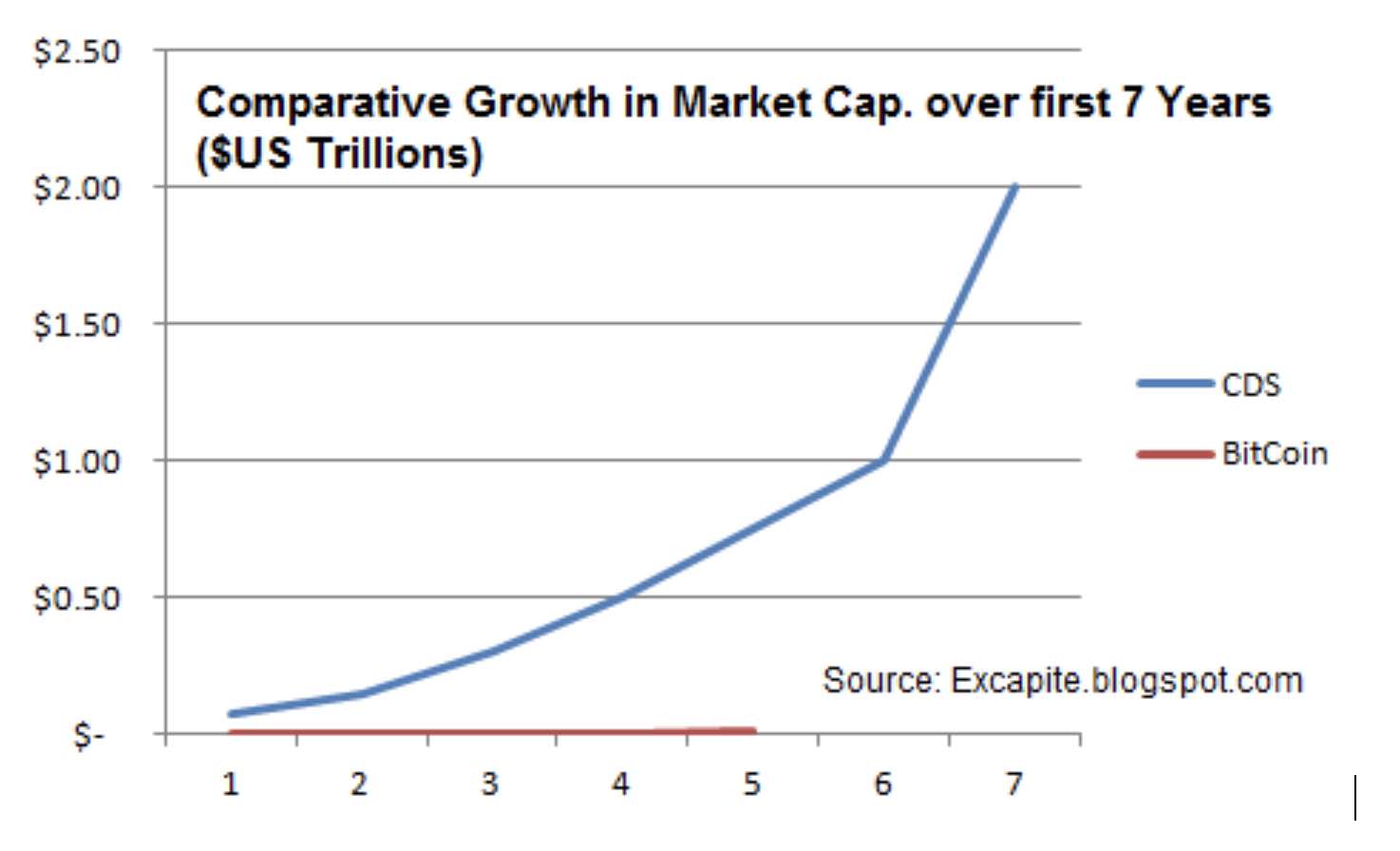
What is interesting is just how much noise Bitcoin is generating and how this noise is changing market attitudes.
For example let's compare the noise level around Credit Default Swaps, the catalyst for the GFC, with the noise level around BitCoin over the past few years.
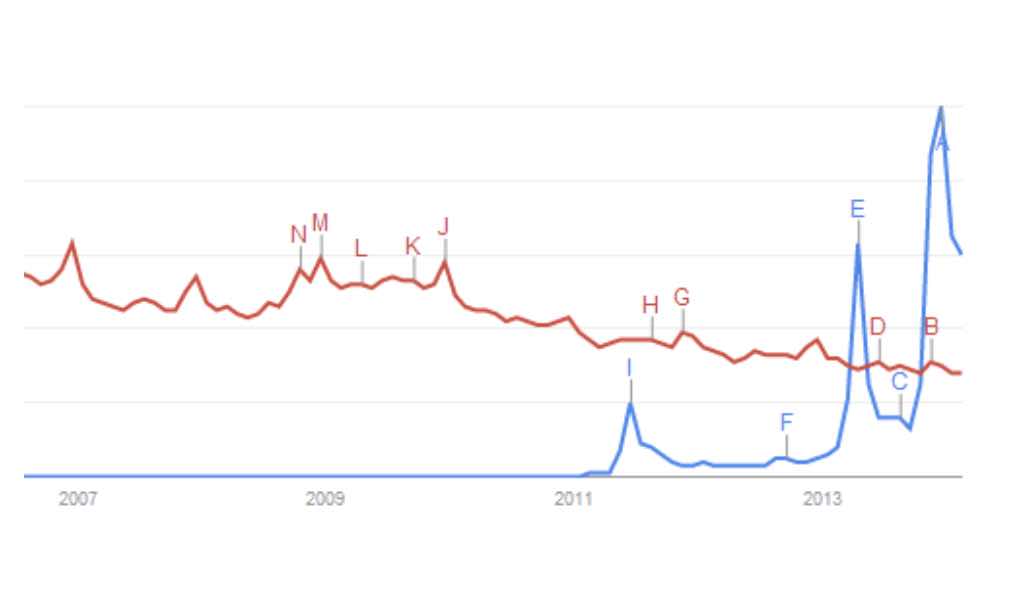
Now let's map the relative press interest vs. the relative market value of the two financial instruments over the past two years.
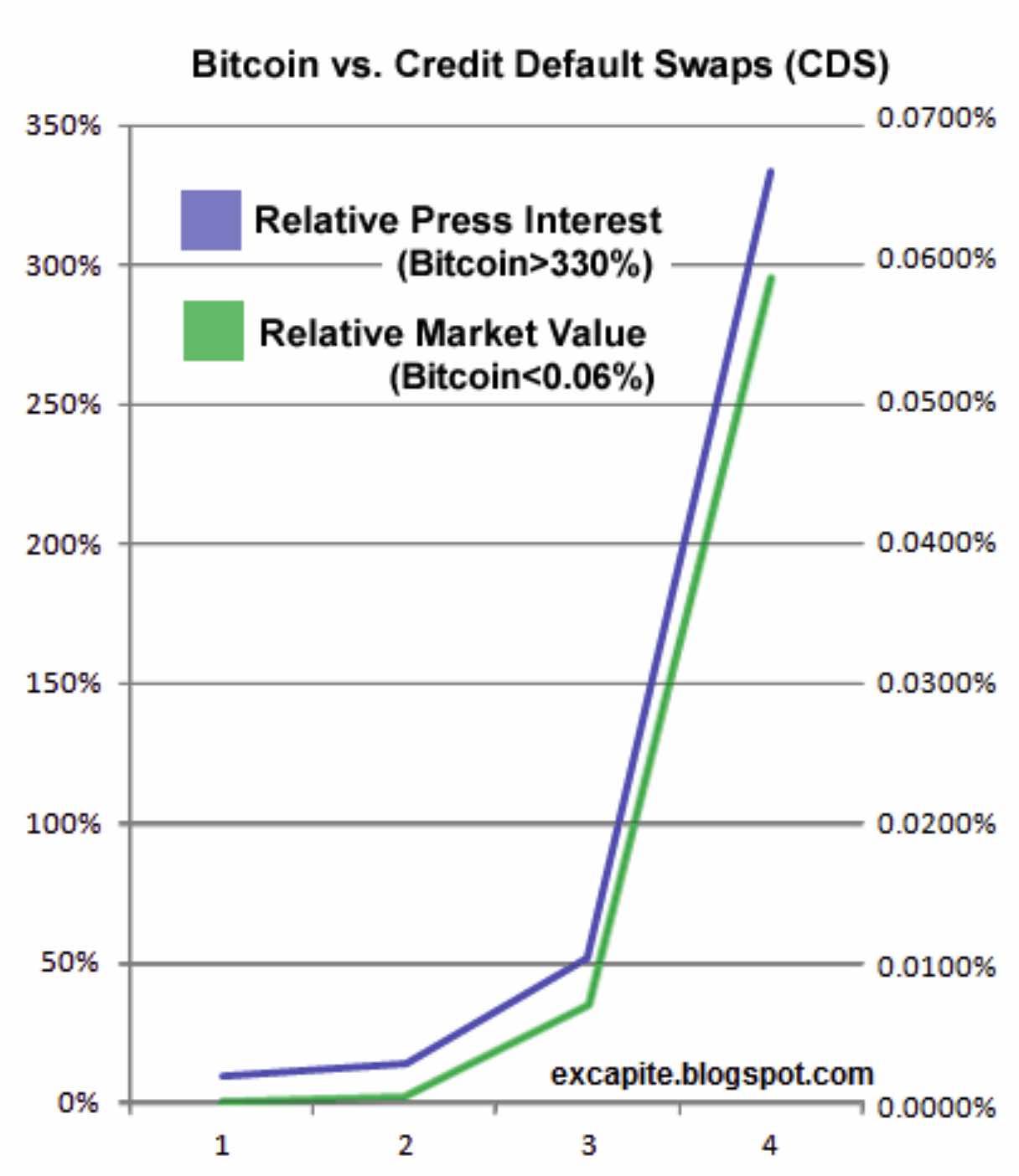
Do you see how the narrative leads the price? Do you see how critical the narrative is in setting market expectations for this new financial instrument? More importantly do you see how the rise in the Bitcoin narrative masks the decline in the CDS narrative. Even though, unlike the underlying problem of the CDS debt crippling the financial system worldwide, Bitcoin's impact on the world of finance is infinitesimal? Mere entertainment in the scheme of things. More over it doesn't even address the fundamental problems buried deep within the global finance markets. It doesn't change the game.
The point being. Narratives are still important. Storytelling is important. Media is still important. They are still the game changers. They still shape our imaginations, or interests and of course our expectations. You just need to learn how to use them to your advantage.
This then is the lesson to be learnt from the Bitcoin story. However dull the underlying technology or the disruptive premise may be.
Changing the token doesn't change how we play the game. But changing the rules, this is how we change the game. And the key to changing the rules is in the stories we tell. How we use stories, however technical or elaborate, to seed ideas that excite the market to adopt new ways of thinking. And new ways of thinking become new behaviours. New habits. New ways of doing business. New ways of living. New ways of doing.
It is the old mantra of Logic + Emotion.
Logic leads to conclusion. Emotion leads to action.
Some games are so much fun to play we become emotionally involved. These are the games that win hearts and minds. As for the currency? That's just a way of keeping score. The main things is getting everybody excited enough to play, and keep playing, even when they are losing, badly.